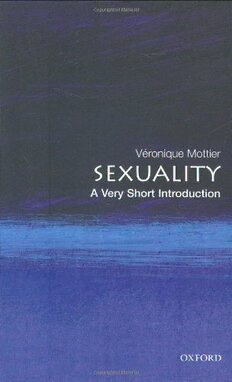
Sexuality: A Very Short Introduction (Very Short Introductions) PDF
169 Pages·2008·2.954 MB·English
Most books are stored in the elastic cloud where traffic is expensive. For this reason, we have a limit on daily download.
Preview Sexuality: A Very Short Introduction (Very Short Introductions)
Description:
The fascination, some would argue the obsession, with sex and gender has come to be (together with race and class) one of the cornerstones of modern humanistic scholarship. The view of sexuality that has come to dominate the modern academic discourse is largely based on the idea of sexuality as a particular cultural construct, much like a religious ritual or a political system. In that regard the study of sexuality is reduced to the study of ideas about sexuality, mostly through the prism of literary and philosophical writings throughout the history. Of course, this line of inquiry is highly restricted: it places premium on societies and cultures that left behind a lot of textual evidence, which probably skews the impression about what sexual norms were like throughout history. This book plays wholeheartedly into that narrative about sexuality. It subscribes wholeheartedly into the whole view of history of sexuality as mostly care-free, except for that long backward interlude of oppressive Christian attitudes. This becomes particularly glaring when in attempt to prove its points it sacrifices historical continuity and jumps back and forth through writings of Augustine, Calvin, Luther and Origen without necessarily pointing out that they were separated by more than a thousand years.
Most of the philosophical outlook of this book can be traced to Michel Faoucolt and his "History of Sexuality." Having one particular ideological outlook feature so prominently hardly makes this into a book with a broad outlook or utility.
The book repeats and reemphasizes the supposed distinction between "sex" and "gender." This is really a distinction without difference. Nowadays it only has much currency in academic circles, and predominantly in humanities.
The biological basis of sexuality receives the worst treatment, its main points barely being mentioned in a single sentence. On the other hand the criticism of the biological model receives many subsequent paragraphs. This is patently absurd: sex is the biological process par excellence, and to neglect the biological basis of sex is like neglecting the physical basis of gravity. Yes, you can still talk a lot about how people have conceptualized it over the millennia, but this would not do justice to the subject.
Most of the book is focused on the politics of sexuality from the middle of the nineteenth century until the present. Some of the most arcane and idiosyncratic political theories are described and discussed, oftentimes in terms of academic jargon straight out of a graduate seminar in humanities. The book is as exciting to read as watching an old lady clip her toenails. I can't imagine that a book on the most fun topic imaginable can be as dry and boring. If you are into the whole postmodern-deconstruction-critiques-analysis stuff, this might be the book for you. Otherwise, save a few books and instead of buying this book and go out with a group of friends to a bar and trade stories. You'll certainly learn more about sex that way.
One good thing about this book is the quality of writing. Material for the most part is presented in a clear and readable way, at the high level that one has come to expect from similar books in the "very short introduction" series.
See more
The list of books you might like
Most books are stored in the elastic cloud where traffic is expensive. For this reason, we have a limit on daily download.
